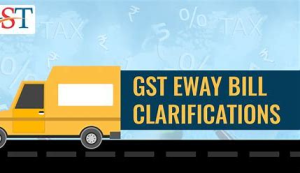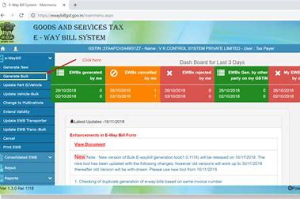The e-way bill mechanism under GST aims to improve transparency in the interstate movement of goods. However, given that certain consignments are exempt from generating e-waybills, some key questions commonly arise. This FAQ clarifies doubts regarding exemptions to enable hassle-free cargo movement.
Answering Common Questions about E-Waybill Exemptions
-
Which goods are exempt from e-waybills?
153 goods like fruits, vegetables, milk, paneer, cereals, etc. are exempt as per GST rules. Apart from these, items like alcohol, petroleum products, and exempt supplies under Schedule III are excluded.
-
Is an e-waybill compulsory for all interstate transport?
E-waybills are mandated only for consignments above Rs. 50,000 in value. Smaller consignments are exempt according to the latest GST provisions.
-
Can exempt goods be transported without an invoice?
No, exempt goods must also be accompanied by either a tax invoice, delivery challan, or other valid document during transit. The e-waybill exemption only removes documentation requirements.
-
How is the movement of exempt containers tracked?
Containers carrying exempt cargo can be tracked using RFID and IoT devices to provide real-time monitoring despite missing e-waybills.
-
What documents are needed for exempt rail transport?
A chassis number or any official goods carriage certificate is mandatory during the rail movement of exempt cargo by authorized transporters.
Also Read: Exemptions From E-Waybill: Understanding The Criteria And Categories
Clearing Doubts on E-Waybill Exemptions for Businesses
-
Can exempt goods be queued for e-waybill generation?
Yes, exempt goods can also be queued like regular consignments. The system accepts documentation details saved in draft. Only the actual generation of a bill is required.
-
How do you identify newly exempt goods or HSNs?
The quarterly return Form GSTR-1 has dynamic tables listing all codes exempted from e-waybills. Refer to the latest form before goods are dispatched.
-
Is vehicle detention possible despite a valid exemption?
Yes, falsely claiming exemption where it is not applicable makes cargo liable for holding and penalties. Verify eligibility.
-
Can transporters update vehicle numbers for exempt goods?
Yes, the facility to capture and modify vehicle numbers exists for exempt goods to improve visibility. But only e-waybill generation is not mandated.
-
Is a reverse charge paid for exempted inward supply?
Certain notified exempted goods attract partial tax under a reverse charge payable by the recipient. Otherwise, no tax is due.
Legal Clarification on Frequently Asked E-Waybill Exemption Queries

-
What documents substantiate exemption from e-waybills?
Supplier invoices, contracts, goods exemption certificates, and customs supervision papers constitute evidence for exemption.
-
Is the exemption scope the same for interstate and intrastate dispatch?
E-waybill exemption applicability differs for inter- and intra-state transactions based on the statutory instruments governing each case.
-
Can exemption eligibility be revalidated after goods are dispatched?
No retrospective exemptions are allowed. Ineligible cargo can be detained with a penalty imposition.
-
Who can clarify the ambiguity in the exemption scope?
GST authorities, GST practitioners, and tax consultants are qualified to offer clarity regarding vague or complex exemptions.
-
What is the prescribed exemption record retention period?
Businesses have to preserve exemption records for at least 5 years as per tax laws to avoid violations.
Industry-wise Insights on Common E-Waybill Exemption Queries

Agriculture
- Most agricultural products, like fruits and vegetables, are exempt, allowing hassle-free rural logistics.
- But processed or packaged items require an e-waybill for consignments above Rs. 50,000.
Auto Manufacturing
- Car parts are not exempt; hence, OEMs need comprehensive e-waybill process integration with dealers.
- But exemptions benefit ancillaries supplying small loads below the threshold.
Pharma
- As life-saving medicines are exempt, tracking distribution trucks carrying critical supplies remains manual.
- Warehouse monitoring dependencies also heighten during crises due to a lack of e-waybill integration.
FMCG
- Exemptions bring efficiency for supply units shipping grocery items below Rs. 50,000 to retail outlets.
- But DCs face inventory analysis gaps due to low-value depot transfers happening without bills.
Thus, implications vary based on the goods profile and logistics networks.
Addressing Challenges and Misconceptions Related to E-Waybill Exemptions
Navigating goods exempted from e-waybills often gives rise to ambiguities that need clarification through open communication and dialogue among stakeholders. Let’s explore key areas of concern.
-
Ambiguity in Exemption Applicability
Determining the eligibility of a particular product or consignment for e-waybill exemption tends to be subjective at times, based on the interpretation of notification texts. For example, food items are exempt, but the moment they are packaged, ambiguity emerges regarding applicable tax codes. Similar confusion prevails on whether ancillary spare parts of an exempt piece of equipment, say a dairy processing plant, also qualify automatically for exemption or warrant a separate analysis.
Such gray areas lead to differing standpoints between suppliers shipping goods and authorities monitoring cargo movement, resulting in unintended non-compliance. To avoid consignment delays at checkpoints due to a lack of clarity, reconfirming exemption scope at SKU-level periodically is a prudent practice. Regulations mandate preserving digital evidence substantiating any exemption relied upon for safe passage of freight. Seeking certified GST practitioner guidance also helps ascertain the correctness of the internal assessment, providing an additional layer of reassurance.
-
Increased cargo safety risks
While e-waybill generation necessities involve cumbersome documentation, they ensure systemic recording of goods location, preventing theft, damages, etc. However, in the absence of e-waybills for exempt cargo, such consignments remain outside the ambit of standard digital tracking protocols. Reliance solely on manual supervision proves inadequate considering the scale of logistics operations, heightening the risks of pilferage.
Though various IoT-driven mechanisms allow remote surveillance capability, integrating such options entails infrastructural investments, which smaller firms struggle with. Cargo insurance serves as a worthwhile safeguard, but premium costs eventually get transferred to consumers. Thus, safety risks in the exempt consignment environment need coordinated redressal through technological as well as collaborative means.
-
Time-bound validity of exemptions
Barring certain perpetual goods categories, several exemptions enjoy only limited validity spanning definite fiscal periods or until sector stabilization based on policy directives. For instance, COVID-19 led to relaxations for healthcare products that now face progressive e-waybill mandates with normalization. For smooth transitioning, adequately factoring in tenure-bound exemptions in supply chain protocols like inventory planning, contract negotiation, etc. holds significance.
Their abrupt expiration without adequate preparatory alignments to migrate to the standard operating environment can hurt business continuity. Hence, tracking renewals or cessations of exemptions constitutes an important, ongoing organizational responsibility with cross-department participation to avoid fire-fighting mode reformulations later.
-
Exclusion of Specific Product Variants
While primary commodity groups may find a place in the exemption list, certain sub-categories or value-added variants get specifically excluded from the benefits. Although fresh fruits and vegetables have an e-waybill exemption, packaged items like canned pineapple chunks or peas as part of ready-to-eat meals attract documentation requirements for interstate transfers.
Such exclusions demand careful evaluation of tariff codes across procurement catalogs prior to goods dispatch. Erroneous optimization attempts defer mandated compliance through misleading exemption assumptions punishable under GST laws. Seeking professional advice can help reliably identify applicable codes for variants.
-
Inter-state transport restrictions
Particular commodities enjoy e-waybill exemptions only for intra-state movement while needing documentation compliance for crossing state borders through accompanying cargo. For instance, specific agricultural products, such as eggs, unbranded honey, etc., mandate interstate e-waybills, despite exemption from the same during in-state transfers.
Unless you are aware of these finer differences, wrongful interpretations can translate into infractions, attracting penalties for stakeholders operating across geographical jurisdictions. Thus, caution must be exercised when referring to administrative rulings or legal opinions to correctly comprehend the terms of statutory exemptions prior to logistics. This averts unintended violations.
Being cognizant of these avenues of confusion can enable constructive problem resolution.
Continuous Improvement in Communicating E-Waybill Exemptions

- Regularly conduct internal training programs to spread awareness within logistics teams.
- Closely track the change in GST. Notifications released on the portal regarding the introduction or capping of exemptions
- Subscribe to relevant forums to stay updated about the latest developments or potential reforms in the pipeline.
- Maintain templates classifying goods as exempt or non-exempt for quick reference during consignment preparation.
- Automate notifications indicating changes in any cargo category’s exemption status.
- Scan business news publications, keeping abreast of industry best practices fit for adoption.
Adopting these disciplined approaches helps sustain informative decision-making despite the complexities surrounding exemptions.
Proactive Communication Strategies for Businesses Regarding E-Waybill Exemptions
If enhancing ecosystem understanding regarding e-waybill exemptions constitutes an organizational priority, investing in some structured communication mechanisms merits consideration.
-
FAQ Literature
Informative booklets encapsulating responses to frequently raised e-waybill queries can benefit internal teams and external partners alike through handy reference material. Listing out the goods inclusion list, likely documentation expectations, potential pitfalls, etc. in lucid FAQ format enables clarifying ambiguities for readers in a standardized, easily comprehensible fashion.
-
Digital Information Repositories
Business Portal dashboards and centralized repositories with well-classified GST exemption-related information, including updated notifications, advisories, etc., can assist employees in navigating policy changes impacting logistics decisions.
-
External Stakeholder Briefings
Consider conducting periodic knowledge-sharing workshops targeted at vendor communities or logistics partners focused on recent updates relating to e-waybills and documentation needs.
-
Compliance Process Visibility
Leveraging technology aids by ensuring organization ERP/TMS suites prominently highlight the latest lists of goods exempted from e-waybills drawn from reliable sources such as GSTN/GSP databases.
-
Exemption reporting in leadership meetings
To underscore the importance of staying vigilant to frequent changes announced in statute-driven exemptions applicable to goods movement, senior management review forums must devote agenda time to examination.
Evaluating Industry Best Practices for E-Waybill Exemptions Communication
Large enterprises have excelled at managing changes around exemptions through:
- Robust Automation: Rules engines, customized algorithms, culling info from ICEGATE, GSTN
- Interactive Chatbots: Using AI/ML for real-time query resolution relating to exemptions
- Control Towers: centralized command centers with multi-disciplinary teams guiding compliance
- Integrated Analytics: Combined TMS-ERP-GSP solutions provide unified visibility.
- Procedural Standardization: stringent ISO-certified processes ensuring uniformity in compliance
Drawing key lessons from pioneers equips smaller firms to stay agile.
Also Read: Best Practices For E-Waybill Validity Management: Timely Renewal And Monitoring
Keeping Informed of Regulatory Changes Impacting E-Waybill Exemptions
In the dynamic taxation environment, policies governing consignment transportation evolve rapidly, requiring close monitoring. This enables optimal utilization of prevailing exemptions without violations, as revisions reshape compliances frequently.
-
Threshold Exemption Changes
The Rs 50,000 ceiling applicable for generating e-waybills may undergo upward revision based on sectoral performance, especially for MSME inclusion. This can expand the ambit of small cargo while enjoying simplified logistics documentation and merit tracking.
-
Rate Changes
Rate rationalization for certain goods or, conversely, the imposition of taxes on exempt categories can have direct implications for corresponding e-waybill mandates. Any such migrations between taxable and exempt brackets warrant careful noting.
-
New Inclusions/Exclusions
The official 153 goods listing sees frequent modifications through additions or removals of select articles like packaged commodities, specialty chemicals, etc., affecting their exemption status. Regular scans help identify the latest entrants.
-
Tenure Extensions
Timebound exemptions across different deadlines get reviewed by authorities periodically, which may conclude in scope enhancement or phased withdrawals through new sunset dates. Policy awareness here prevents disruption.
-
Procedural Amendments
E-waybill generation procedures themselves undergo key amendments in terms of requisite supporting documentation, say GPS, RFID integration, etc., that require strategic adoption.
Thus, various moving parts in the regulatory sphere call for alert tracking mechanisms by enterprises relying extensively on exemptions for smooth freight movement.
Want to know about the MSME sector? Then click on this blog post by Captainbiz.
Also Read: Inter-State Vs. Intra-State Exemptions: Navigating The Variation In E-Waybill Regulations
Enhancing Customer Service through E-Waybill Exemptions Communication
Some constructive approaches to assisting trade partners include:
- FAQ Brochures: Detailing e-waybill exemption specifics for easy understanding
- Web Repository: A central portal displaying categorized goods exemption lists
- Email/SMS Alerts: Proactive notifications regarding changes in exemption status
- Help Desk: Dedicated assistance team to address transportation queries
- Online Training: DIY Animation Videos Simplifying Complex Concepts
These technology interventions demonstrate commitment to collaborative growth.
Conclusion
To summarize, a wide array of goods are exempt from e-waybill requirements, offering logistics simplification benefits and cost savings for businesses. Yet opting out calls for additional diligence like verifying eligibility, maintaining records, and monitoring changes to avoid infractions.
A proactive approach also involves building awareness among internal teams as well as external partners through training, digitization, and two-way communication. By clearly understanding exemption provisions as well as obligations, trade ecosystem stakeholders can collectively build a compliant, efficient, and transparent goods movement system.
